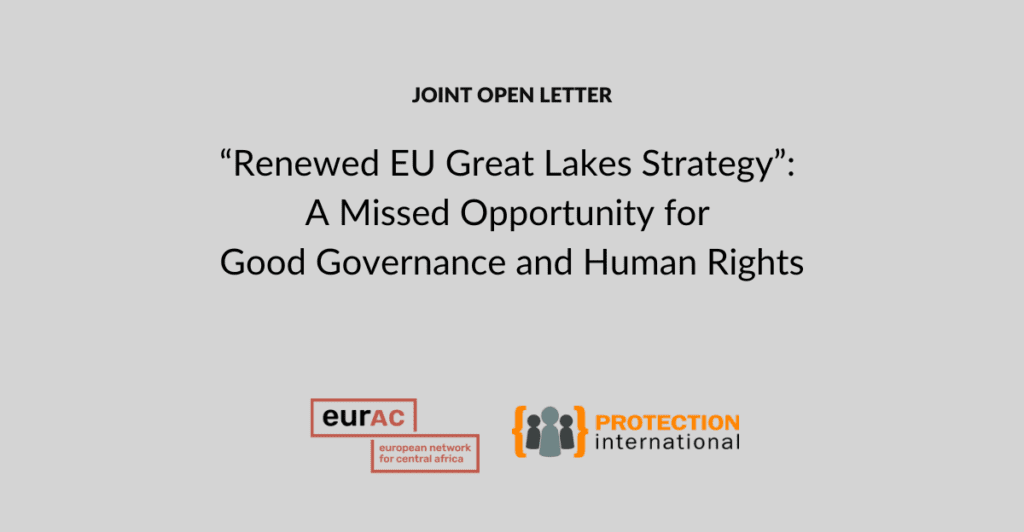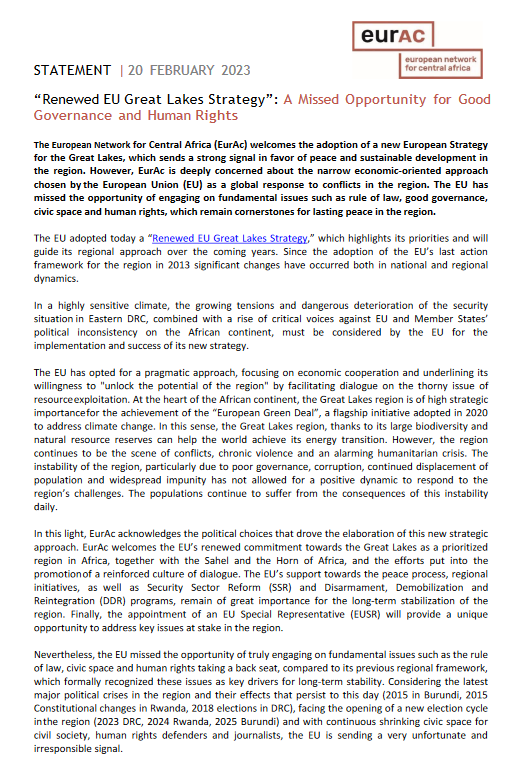The European Network for Central Africa (EurAc) welcomes the adoption of a new European Strategy for the Great Lakes, which sends a strong signal in favor of peace and sustainable development in the region.
However, EurAc is deeply concerned about the narrow economic-oriented approach chosen by the European Union (EU) as a global response to conflicts in the region.
The EU has missed the opportunity of engaging on fundamental issues such as rule of law, good governance, civic space and human rights, which remain cornerstones for lasting peace in the region.
The EU adopted today a “Renewed EU Great Lakes Strategy,” which highlights its priorities and will guide its regional approach over the coming years. Since the adoption of the EU’s last action framework for the region in 2013 significant changes have occurred both in national and regional dynamics.
In a highly sensitive climate, the growing tensions and dangerous deterioration of the security situation in Eastern DRC, combined with a rise of critical voices against EU and Member States’ political inconsistency on the African continent, must be considered by the EU for the implementation and success of its new strategy.
The EU has opted for a pragmatic approach, focusing on economic cooperation and underlining its willingness to “unlock the potential of the region” by facilitating dialogue on the thorny issue of resource exploitation. At the heart of the African continent, the Great Lakes region is of high strategic importance for the achievement of the “European Green Deal”, a flagship initiative adopted in 2020 to address climate change. In this sense, the Great Lakes region, thanks to its large biodiversity and natural resource reserves can help the world achieve its energy transition. However, the region continues to be the scene of conflicts, chronic violence and an alarming humanitarian crisis. The instability of the region, particularly due to poor governance, corruption, continued displacement of population and widespread impunity has not allowed for a positive dynamic to respond to the region’s challenges. The populations continue to suffer from the consequences of this instability daily.
In this light, EurAc acknowledges the political choices that drove the elaboration of this new strategic approach. EurAc welcomes the EU’s renewed commitment towards the Great Lakes as a prioritized region in Africa, together with the Sahel and the Horn of Africa, and the efforts put into the promotion of a reinforced culture of dialogue. The EU’s support towards the peace process, regional initiatives, as well as Security Sector Reform (SSR) and Disarmament, Demobilization and Reintegration (DDR) programs, remain of great importance for the long-term stabilization of the region. Finally, the appointment of an EU Special Representative (EUSR) will provide a unique opportunity to address key issues at stake in the region.
Nevertheless, the EU missed the opportunity of truly engaging on fundamental issues such as the rule of law, civic space and human rights taking a back seat, compared to its previous regional framework, which formally recognized these issues as key drivers for long-term stability. Considering the latest major political crises in the region and their effects that persist to this day (2015 in Burundi, 2015 Constitutional changes in Rwanda, 2018 elections in DRC), facing the opening of a new election cycle in the region (2023 DRC, 2024 Rwanda, 2025 Burundi) and with continuous shrinking civic space for civil society, human rights defenders and journalists, the EU is sending a very unfortunate and irresponsible signal.
Peace in the Great Lakes region cannot be achieved without sustained political efforts to encompass all the root causes of conflict, including in the areas of governance, state-building, rule-of-law and the fight against impunity which remain cornerstones to consolidate the outcomes of the strategy, frame resource-related economic developments and in fine achieve security, peace and welfare for the population of the region.
Considering the above-mentioned elements, EurAc, together with its members, urges the EU and its Member States to:
- Appoint an EU Special Representative to the region and provide sufficient budgetary provision for the proper running of its mandate in order to facilitate dialogue processes between stakeholders and re-affirm the willingness of the EU to actively commit to peace in the region. Considering the shortcomings of the general strategy, the EUSR’s mandate should have a strong focus on governance, rule of law and human rights.
- Strengthen the coherence of all its external policies, especially regarding public declaration and financial/political support to stakeholders in the region. The EU and the Member States should not let regional economic potentialities and private sector interests continue guiding their action to the detriment of the welfare of the local population. A strong emphasis must be laid on the respect of all human rights, as well as the commitments included in the EU’s Action Plan on Human rights and Democracy, Gender Action Plan III, and the EU’s newly adopted Youth Action Plan.
- Commit to the highest standards of inclusiveness and transparency while implementing the strategy by strengthening ownership by local civil society organisations and populations. Considering the limited time and space for input offered to civil society organizations in the elaboration of this strategy, a larger transparent consultation process with regard to the EUSR’s mandate would be a first step in the right direction.
The joint statement is also available in French.



 English
English